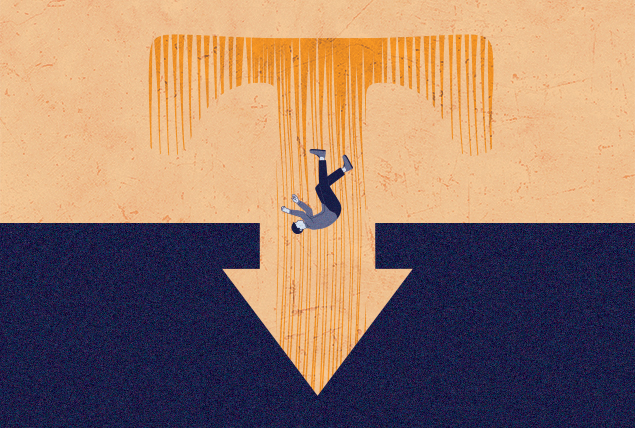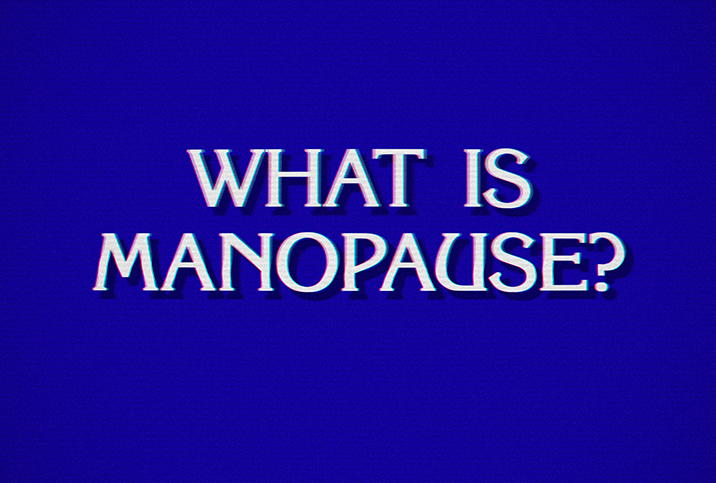Wait, Andropause and Hypogonadism Aren't the Same?

These days, the topic of low testosterone (low-T) is fully in the mainstream. TV ads feature former athletes talking about it and how they've overcome it with the help of product A or B. Specialty clinics have popped up with solutions that include testosterone replacement therapy (TRT). Low-T is everywhere.
Fair enough. But what, exactly, constitutes low testosterone? What are the conditions that cause it? What are the different types of low-T?
Here, we look at a couple of testosterone-related conditions—andropause and hypogonadism—and discover what those terms mean, what they don't mean and how they fit into the bigger picture of true, clinically diagnosed low testosterone.
What is hypogonadism?
The term hypogonadism refers to men whose bodies don't produce enough of the hormone testosterone, a condition that data suggests may affect 2 percent to 8 percent of the male population, according to Cleveland Clinic.
It can lead to low sex drive and mood swings, although hypogonadism may not be the most common word for this condition anymore.
"There are a lot of terms people use," said Amy Pearlman, M.D., a men's health specialist and co-founder of Prime Institute in Fort Lauderdale, Florida. "The term that's used in the American Urological Association guidelines is 'testosterone deficiency,' so that's the term I use a lot more often."
The AUA guidelines state that a confirmatory test showing less than 300 nanograms per deciliter (ng/dL) of total testosterone is needed to support a diagnosis of low-T, but you must also have signs and symptoms.
"TRT is for people who have low testosterone levels on their blood test as well as symptoms or signs of it," Pearlman said. "Neither one alone would warrant someone being on therapy. So just a single testosterone level is not enough."
To understand how doctors assess your bloodwork when considering TRT, it helps to learn how testosterone production works in your body.
Testosterone is produced in the testicles, but the process actually begins in the hypothalamus, a structure deep within the brain. The hypothalamus sends out hormonal signals when testosterone levels in the body are low, communicating with the pituitary gland at the base of the brain. This pea-sized gland then sends out another signal called luteinizing hormone (LH) to the testicles, prompting them to produce more testosterone.
It's this signal pathway that helps healthcare providers determine what's really going on with your testosterone production.
"Whenever I have someone with lower testosterone, I order a confirmatory testosterone level in the morning, then also order some additional blood tests like LH, prolactin, a thyroid panel, prostate-specific antigen, those sort of things," said Neel Parekh, M.D., a men's fertility and sexual health specialist with Cleveland Clinic.
If the LH is elevated and testosterone is low, that indicates a condition called primary hypogonadism, he explained. The brain is sending the signal to make testosterone, but the testicle is not producing testosterone.
"This is one of the FDA-approved indications for prescribing testosterone or TRT," Parekh said.
What is andropause?
Hypogonadism, or testosterone deficiency, can affect males of any age.
On the other hand, the condition that some people call andropause, or "male menopause," is meant to indicate older men and the natural decline in testosterone production that occurs with age. Since it is a natural, gradual change, even calling it a condition is a bit of a misnomer.
These changes are slight and incremental and may even go largely unnoticed.
"The thing is, testosterone levels don't actually go down that much due to age," Pearlman said. "They go down after about age 30, but it's only about 1 percent per year."
All else being equal, you can likely remain well above the clinical diagnosis level for low-T even into your 70s. The thing is, all else frequently isn't equal. That is to say, it's often not just aging that causes testosterone deficiency problems, it's other factors.
"A lot of what we see is actually related to other conditions a person has and not necessarily due to age," Pearlman said. "I see a lot of guys who are in their 60s, 70s and 80s who eat healthy and exercise, and their testosterone levels might be higher than guys in their 30s who have diabetes and who are obese."
So, yes, age is one of many factors. The other causes of low testosterone could impact people of any age, including the following:
- Chemotherapy
- Metabolic disorders
- Chronic illness
- Alcohol use disorder
- Chronic kidney disease
- Obesity
- Diabetes
- Sleep apnea
"There are like 20 different causes of low testosterone, and age is only one of them," Pearlman said.
The other thing to keep in mind about the term andropause is that it's a bit of a loaded word. It's derived from menopause, the time in a woman's life when she stops ovulating and her estrogen levels plummet sharply. Menopause, though, as it typically happens to women, is a very different condition from men's gradual testosterone decline.
"I just usually talk about it as 'lower testosterone,'" Parekh said. "And that's something I tell patients every day: It's just a normal part of aging. Unless they're having symptoms, we don't just treat a lower testosterone level. We don't just treat a number."
Conclusions
Calibrating testosterone levels is a complex, multi-organ process that most male bodies manage to carry out quite well.
If you genuinely have testosterone deficiency symptoms and you get two or more tests to confirm low levels, of course, you should be treated for it.
Just make sure you talk with your family physician, a urologist or another trusted healthcare provider to get a clear understanding of how TRT works before you try to diagnose and treat yourself.
And if you don't have a regular physician, now is the time to find one. Giddy Telehealth takes the difficulty out of such a search, providing access to hundreds of healthcare professionals who offer video visits as a regular part of their practices. It is an easy-to-use online portal whose physicians, therapists and others have expertise across the full scope of medical care. Many have same-day appointments.
Editor’s note: Giddy welcomes first-person stories that break down stigmas and connect with readers to let them know they're not alone. Are you affected by low-T, or did you overcome it? Are you willing to share your story to help others in a similar situation? We'd like to hear from you. Send a message to Mike Werling at mwerling@getmegiddy.com.


















